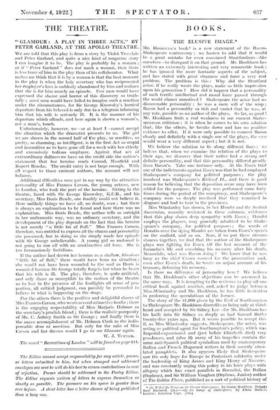THE THEATRE.
" GLAMOUR : A PLAY IN THREE ACTS," BY PETER GARLAND, AT THE APOLLO THEATRE.
WE are told that this play is from a story by Violet Tweedale and Peter Garland, and quite a nice kind of magazine story I can imagine it to be. The play is probably by a woman ; or if " Peter Garland " does not mask a woman, then there is less trace of him in the play than of his collaborator. What makes me think that it is by a woman is that the best moment in the play is when the lady secretary who has reciprocated her employer's love is suddenly abandoned by him and realizes that she is for him merely an episode. Few men would have expressed the shame and horror of this discovery so truth- fully ; most men would have failed to imagine such a reaction under the circumstances, for Sir George Knowsley's hurried departure from his beloved is only due to a telegram informing him that his wife is seriously ill. It is the manner of his departure which offends, and here again is shown a woman's, not a man's, touch.
Unfortunately, however, we—or at least I—cannot accept the situation which the dramatist presents to us.' The girl we are shown in the second half of the play, so sensitive, so pretty, so charming, so intelligent, is in the first Act so stupid and insensitive as to have gone off for a week with her elderly and excessively tedious employer. Against that act of extraordinary dullness we have on the credit side the author's statement that her heroine reads Conrad, Masefield. and Rupert Brooke. The credit entry is not large enough. With all respect to those eminent authors, the account will not balance.
Additional difficulties were put in my way by the attractive personality of Miss Frances Carson, the young actress, new to London, who took the part of the heroine. Sitting in the theatre, faced with Sir George Knowsley, K.C.B., and his secretary, Miss Doris Reade, one frankly could not believe it. More unlikely things we have all, no doubt, seen ; but there is always an explanation to be found and here there was no explanation. Miss Doris Reade, the author tells us outright in her undramatic way, was no ordinary secretary, and the development of the play depends on the fact that the heroine is not merely " a little bit of fluff." Miss Frances Carson, therefore, was entitled to express all the charm and personality she possessed, but in doing so she simply made her episode with Sir George unbelievable. A young girl so endowed is not going to run off with an unattractive old bore. She is too harmoniously fastidious.
If the author had drawn her heroine as a shallow, frivolous " little bit of fluff," there would have been no situation ; she would not have been wounded to the soul as Doris is wounded because Sir George totally forgets her when he hears that his wife is ill. The play, therefore, is quite artificial, and only those so susceptible to the realism of the theatre as to lose in the presence of the footlights all sense of pro- portion, all critical judgment, can possibly be persuaded to believe in what is happening on the stage.
For the others there is the positive and delightful charm of Miss Frances Carson, who wears several attractive frocks ; there is the engaging respectability of Miss Marjorie Holman as the secretary's prudish friend ; there is the realistic pomposity of Mr. C. Aubrey Smith as Sir George ; and finally there is the suave accomplishment of Mr. Holman Clark as the indis- pensable dcus ex Machina. But only for the sake of Miss Carson and her dresses would I go to see Glamour again.
W. J. TURNER.
The usual " Recreations of London" will be found on page GIL






































 Previous page
Previous page